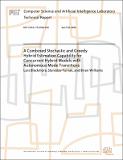A Combined Stochastic and Greedy Hybrid Estimation Capability for Concurrent Hybrid Models with Autonomous Mode Transitions
Author(s)
Blackmore, Lars; Funiak, Stanislav; Williams, Brian
DownloadMIT-CSAIL-TR-2006-032.ps (5175.Kb)
Additional downloads
Other Contributors
Model-based Embedded and Robotic Systems
Advisor
Brian Williams
Metadata
Show full item recordAbstract
Robotic and embedded systems have become increasingly pervasive in applicationsranging from space probes and life support systems to robot assistants. In order to act robustly in the physical world, robotic systems must be able to detect changes in operational mode, such as faults, whose symptoms manifest themselves only in the continuous state. In such systems, the state is observed indirectly, and must therefore be estimated in a robust, memory-efficient manner from noisy observations.Probabilistic hybrid discrete/continuous models, such as Concurrent Probabilistic Hybrid Automata (CPHA) are convenient modeling tools for such systems. In CPHA, the hidden state is represented with discrete and continuous state variables that evolve probabilistically. In this paper, we present a novel method for estimating the hybrid state of CPHA that achieves robustness by balancing greedy and stochastic search. The key insight is that stochastic and greedy search methods, taken together, are often particularly effective in practice.To accomplish this, we first develop an efficient stochastic sampling approach for CPHA based on Rao-Blackwellised Particle Filtering. We then propose a strategy for mixing stochastic and greedy search. The resulting method is able to handle three particularly challenging aspects of real-world systems, namely that they 1) exhibit autonomous mode transitions, 2) consist of a large collection of concurrently operating components, and 3) are non-linear. Autonomous mode transitions, that is, discrete transitions that depend on thecontinuous state, are particularly challenging to address, since they couple the discrete and continuous state evolution tightly. In this paper we extend the class of autonomous mode transitions that can be handled to arbitrary piecewise polynomial transition distributions.We perform an empirical comparison of the greedy and stochastic approaches to hybrid estimation, and then demonstrate the robustness of the mixed method incorporated with our HME (Hybrid Mode Estimation) capability. We show that this robustness comes at only a small performance penalty.
Date issued
2006-04-28Other identifiers
MIT-CSAIL-TR-2006-032
Series/Report no.
Massachusetts Institute of Technology Computer Science and Artificial Intelligence Laboratory